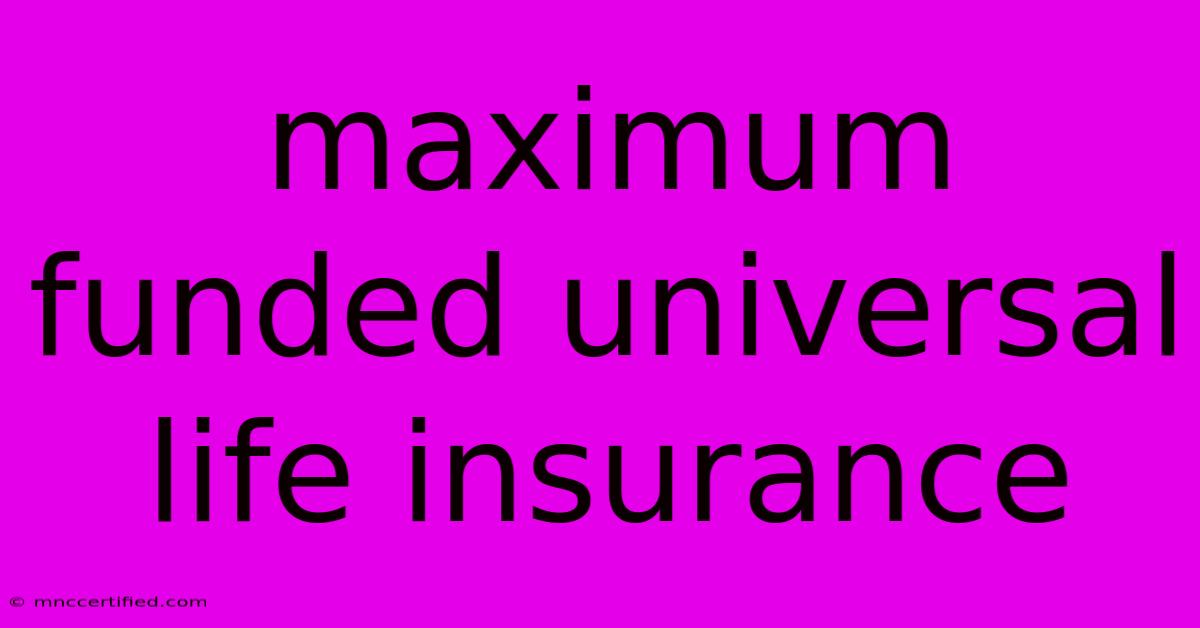Maximum Funded Universal Life Insurance

Table of Contents
Maximum Funded Universal Life Insurance: A Comprehensive Guide
Universal life insurance is a flexible type of permanent life insurance that offers the policyholder the ability to control their death benefit, premiums, and cash value accumulation. Maximum funded universal life insurance, or Max Funded UL, is a strategy where the policyholder makes significant premium payments to maximize the cash value growth and death benefit.
This strategy can be beneficial for those seeking to build wealth and ensure their financial security. But it's crucial to understand the intricacies of this approach before deciding if it's the right fit for your individual needs.
Understanding the Basics of Universal Life Insurance
Before diving into Max Funded UL, let's briefly review the fundamentals of universal life insurance:
- Flexibility: Universal life policies allow you to adjust your premiums, death benefit, and cash value allocation.
- Cash Value Accumulation: Premiums exceeding the cost of insurance accumulate in a cash value account that earns interest. This cash value can be accessed through withdrawals, loans, or even used to pay premiums.
- Death Benefit: The policy provides a death benefit to your beneficiaries upon your passing. The amount of the death benefit can be adjusted over time.
Benefits of Maximum Funded Universal Life Insurance
- Wealth Accumulation: By maximizing premium payments, you accelerate the growth of your cash value, potentially creating a substantial source of wealth.
- Tax-Deferred Growth: The cash value in a UL policy grows tax-deferred, meaning you won't pay taxes on the earnings until you withdraw them.
- Guaranteed Death Benefit: Unlike some variable life insurance policies, Max Funded UL policies typically guarantee a minimum death benefit.
- Potential for Long-Term Growth: Over a longer period, the power of compounding can lead to substantial cash value accumulation, potentially surpassing the initial death benefit.
Potential Drawbacks of Maximum Funding
- High Premiums: Max Funded UL requires substantial premium payments, which may strain your budget.
- Risk of Market Volatility: Some UL policies offer investment options for your cash value, exposing you to potential market fluctuations.
- Potential for Lapses: If you fail to make premium payments, your policy could lapse, jeopardizing your death benefit and cash value accumulation.
- Complexity: Understanding the intricacies of Max Funded UL can be complex and require careful planning.
Who Should Consider Max Funded UL?
- High-Net-Worth Individuals: Max Funded UL is often suitable for those with significant financial resources seeking a robust wealth accumulation strategy.
- Those with Long-Term Financial Goals: This strategy can be beneficial for individuals with long-term financial goals, such as retirement planning or estate planning.
- Those Seeking Tax-Efficient Growth: The tax-deferred growth of cash value offers a tax-efficient way to build wealth.
Alternatives to Max Funded UL
- Indexed Universal Life (IUL): IUL policies link the cash value growth to a specific market index, providing potential for higher returns.
- Variable Universal Life (VUL): VUL policies offer investment options for your cash value, giving you more control over your investment strategy.
Important Considerations
- Consult with a Financial Advisor: Seek professional guidance from a qualified financial advisor to determine if Max Funded UL aligns with your financial goals and risk tolerance.
- Understand the Terms and Conditions: Carefully review the policy terms and conditions before making a decision.
- Consider Your Financial Situation: Ensure you can afford the high premium payments associated with Max Funded UL.
Conclusion
Maximum Funded Universal Life Insurance can be a valuable tool for building wealth and ensuring long-term financial security. However, it's not a one-size-fits-all solution. Before considering this strategy, carefully assess your financial goals, risk tolerance, and budget.
Remember, seeking professional financial advice is essential to make informed decisions about your life insurance needs.

Thank you for visiting our website wich cover about Maximum Funded Universal Life Insurance. We hope the information provided has been useful to you. Feel free to contact us if you have any questions or need further assistance. See you next time and dont miss to bookmark.
Featured Posts
-
How Much Is Insurance On A Rolls Royce
Nov 09, 2024
-
Option 2 Trade Crypto Price Prediction
Nov 09, 2024
-
How Much Does A Barry Bonds Card Worth
Nov 09, 2024
-
Whats The Difference In Bail And Bond
Nov 09, 2024
-
Farm Bureau Insurance Sullivan Indiana
Nov 09, 2024